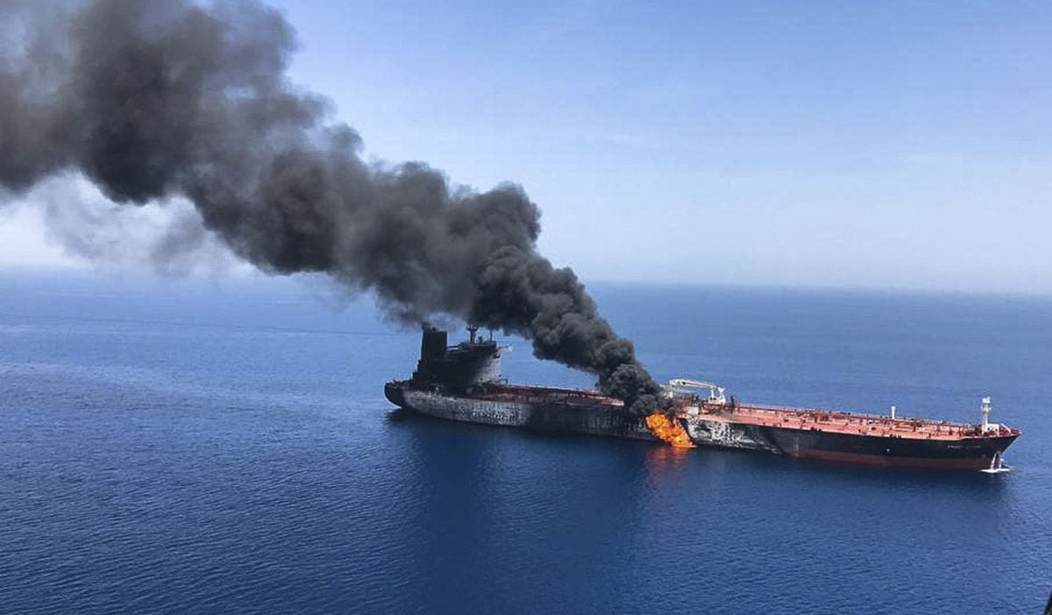The attack on tankers in the Gulf of Oman on Thursday has brought the U.S. and Iran to the brink of armed conflict. But some eyewitnesses aboard one of the tankers and some other governments are questioning the premise that Iran was behind the attack.
Germany’s Foreign Minister Heiko Maas on Friday cast doubt on evidence that the U.S. government claims is proof that Iran was behind an attack this week on two oil tankers in the Gulf of Oman.
The attack on the two vessels, one Japanese and one Norwegian, took place as Japan’s Prime Minister Shinzo Abe was visiting Iran to try to calm tensions between Tehran and Washington.
The U.S. Navy later released a video that purported to show members of Iran’s Revolutionary Guard sneaking over to the ship in the middle of the night to remove an unexploded mine. U.S. officials claimed this is evidence of Iran’s culpability, but Maas argued that the video was insufficient proof to pin the attack on Iran.
“The video is not enough. We can understand what is being shown, sure, but to make a final assessment, this is not enough for me,” Maas told reporters during a press conference on Friday. The boat’s Japanese owner also cast doubt on the theory that a mine had been used to attack the ship, telling journalists that members of his crew had witnessed a flying object.
Iran has denied any role in the event, and some observers have raised questions about whether the intelligence was being used as a pretext for the U.S. to escalate conflict with the country.
A false flag operation? If Iran isn’t responsible, why would they remove a mine from one of the targeted ships? Would they help the ship out of the goodness of their hearts? While it’s certainly possible that the U.S. would manufacture a crisis — and few would put it past Trump to do so — it’s more believable that Iran is wholly responsible.
But why?
Iran has come under massive economic pressure over the past year, since US President Donald Trump unilaterally withdrew from the 2015 nuclear deal and re-imposed some of the most aggressive sanctions in US foreign policy history – targeting Iran’s oil sales, wider energy industry, shipping, banking, insurance and more.
Some of the sanctions, because of their secondary nature, are designed to dissuade other nations from purchasing Iranian oil, the exports of which bring in about 30% of Iran’s revenue.
And they have managed to bring down Iran’s oil exports by more than a third.
That number may get close to zero in a matter of months:
Iran’s response was to scale back its commitments under the nuclear deal and to announce that, if Iran could not export its oil, no other country would be allowed to export theirs.
About 30% of the world’s seaborne oil transports travel through the Strait of Hormuz, a strategic sea passage in the Gulf, on Iran’s south coast.
Iran has made threats in relation to the strait before – but never acted on them.
Tehran’s threat about pulling back from the Obama nuclear deal is designed to scare the Europeans into defying Trump. The last thing Europeans want is for Iran to ramp up its nuclear program.
Indeed, everything Iran needs to build a bomb is ready for assembly — even enriched uranium. Under terms signed by the naive Obama, Iran agreed to send its stockpile of enriched uranium to Russia. Then, last year, it was revealed that Russia had begun shipping the uranium back to Tehran.
Iran on Saturday announced it was taking back another portion of the 20 percent enriched uranium stockpile it handed over to Russia as part of the nuclear deal signed in 2015 with world powers in exchange for sanctions relief.
Spokesman and vice-president of Iran’s Atomic Energy Organization Behrouz Kamalvandi said the re-imposition of US sanctions following President Donald Trump’s exit in May from the accord necessitated returning the uranium for domestic needs.
Did Russia always plan to send the uranium back? Iran certainly didn’t need the excuse of reimposed sanctions to ask for their property back. Under the terms of Obama’s nuclear deal, Russia was under absolutely no obligation to comply with Iran’s request, especially since Putin said that Russia would continue to abide by the terms of the agreement.
They certainly have an odd way of showing it.
So why go to war now? The pressure on Iran is intense. Their economy is failing and the people are tired of the regime’s promises that things will get better. Unemployment, inflation, falling revenue, and food shortages have brought Iran to the brink.
The country is about ready to explode. There may never be a better opportunity to rid the world of a major threat. A full-scale war is not advisable, given the possibility that such a war would almost certainly spread throughout the Middle East. But how about taking out the Iranian navy? One strong push could send the rickety edifice tumbling down.
When the deal was signed in 2015, Obama rescued Iran from economic implosion. Now they’re on the brink again. Will Trump do what Obama was so reluctant to do?










Join the conversation as a VIP Member